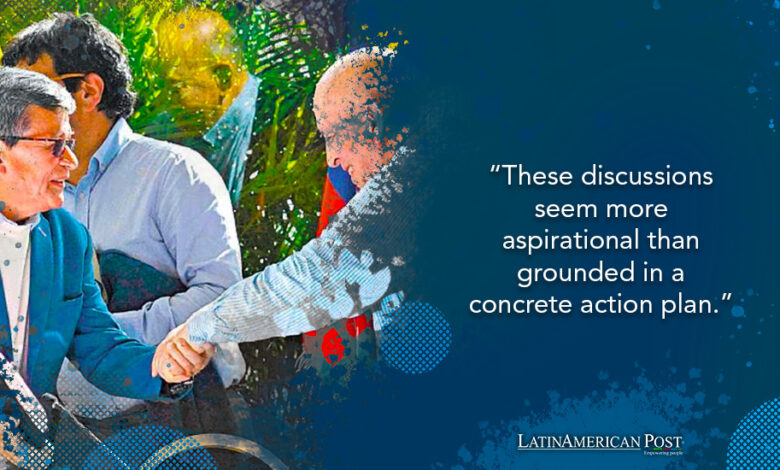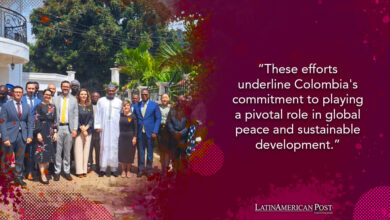Colombia’s ELN Peace Talks: A Journey Without a Map or Destination

Despite recent progress, Colombia’s peace negotiations with the ELN lack a clear direction and fail to address the group’s political aspirations, hindering any meaningful advancement towards a lasting peace in the region.
Facade of Progress in Peace Talks: Lack of Strategic Direction
The recent overcoming of yet another hurdle in the peace negotiations with the National Liberation Army (ELN) in Colombia presents a facade of progress that, upon closer inspection, reveals a concerning lack of strategic direction and understanding of the ELN’s vision for its role in a post-conflict Colombia. The government’s chief negotiator, Vera Grabe, emphasizes the importance of “substantive discussions” about the future of the process and how the guerrilla group envisions itself in a peaceful context. However, these discussions seem more aspirational than grounded in a concrete action plan.
The extraordinary meeting held in Cuba following the ELN’s suspension of talks due to alleged governmental violations showcases the fragile nature of these negotiations. While the parties have agreed to resume societal participation processes and plan to meet again in Caracas, the underlying issues still need to be addressed. The government insists on discussing the long term, aiming to understand the ELN’s aspirations for peace. Yet, with a clear mutual understanding or agreement on what peace entails and how it integrates the ELN into Colombia’s political fabric, these talks can avoid becoming an exercise in futility.
Common Challenges in Latin America: Cautionary Tales in Peace Negotiations
This situation is not unique to Colombia. Across Latin America, countries grappling with internal conflicts face similar challenges in peace negotiations. From Mexico’s struggles with cartel violence to the post-peace agreement challenges in Guatemala and El Salvador, the region offers a backdrop of cautionary tales on the complexities of negotiating with non-state actors. The ELN’s reluctance to prioritize discussions on disarmament and its ambiguous stance on its political role post-conflict highlight a critical obstacle: the transition from armed rebellion to political participation is a path fraught with uncertainty and resistance.
For the ELL, addressing the “end of the conflict” and disarmament is not a priority, reflecting a broader issue within peace processes where armed groups struggle to envision their identities without their weapons. This resistance to disarmament and transformation into a political entity underscores a fundamental misalignment between the government’s goals and the ELN’s aspirations. Without a shared vision, the peace talks risk stagnating, mirroring the protracted negotiations in other Latin American contexts where ideological divides and mistrust undermine the pursuit of peace.
Moreover, the negotiation’s focus seems to overlook the victims of the conflict, despite the ELN’s commitment to halt economic kidnappings. The inclusion of society in the talks has been criticized for not fully representing the affected communities, highlighting another layer of complexity in achieving a peace that is inclusive and representative. This oversight not only diminishes the legitimacy of the talks but also perpetuates the cycle of violence and marginalization that has plagued Colombia for decades.
Peace Pedagogy and Roadmap: Band-Aid Approach Without Clear Direction
The introduction of peace pedagogy by Grabe, while commendable, skirts the issue that without a clear roadmap and a mutual understanding of the ELN’s role in a peaceful Colombia, these efforts may be akin to putting a band-aid on a gaping wound. The comparison to the failed FARC peace referendum is a stark reminder of the challenges ahead. Colombia stands at a crossroads where the path to peace is about ceasing violence and fundamentally reimagining the political landscape to include former adversaries.
Also read: Colombia and ELN Guerrillas Resume Peace Talks, Impacting Broader Latin American Stability
As Colombia navigates these treacherous waters, the lessons from other Latin American countries loom. The success of peace negotiations hinges on the willingness to talk and the ability to envision a shared future where former combatants are integrated into the political fabric. Without a clear plan and an understanding of the ELN’s political aspirations, Colombia’s journey toward peace with the ELN appears to be a journey without a map or a destination, fraught with the risk of never reaching its intended end.





